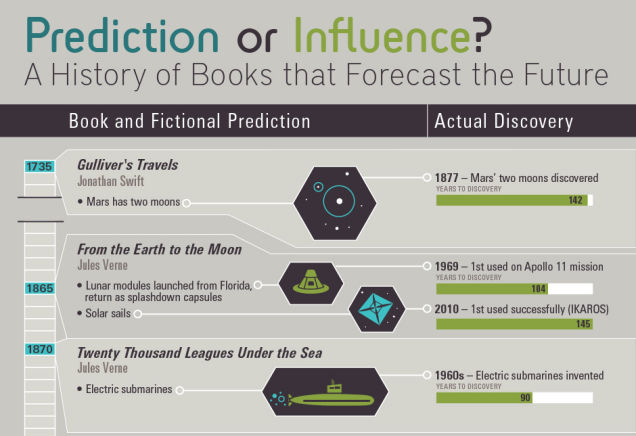My medium of choice is science fiction.  People keep telling me that the things I write qualify as “hard” sci-fi, but through my eyeballs my work is still pretty lightweight compared to guys like Vinge, Gibson, Suarez and Brin.  Thing is though, most of the hard science fiction I’ve run across is “informed” fiction.  When you work in a medium that predicts the future, you have to have a touchstone in the now, a point where you and your reader can both stand upon before taking a step into what comes next.  As a writer it helps keep the tech from overriding the characters, as a reader it helps keep you from getting mindbogglingly lost.
There are lots of posts running around nowadays about how this writer or that writer “predicted” the future, cel phones or satellites or touchscreens, but I think it’s a much more complex relationship than that, it’s rarely just some whiz-kid sitting in her parents basement imagining things to come. See, writers ask questions, they read books, they say “hey I have this idea” and then they go hunt it up, or they go hunt up somebody who knows something about the idea (really, I find that cold-calling as a writer is a much easier thing to do than cold-calling was in my previous life as a stockbroker).
On the opposite side of that, we have the scientists, the ones who are talking to the writers, the ones who are reading the books that get written and saying “hey wouldn’t it be cool if you *could* make a rope out of buckyballs or a solar-powered exoskeleton”. Â (Then as a third leg you get the artists and moviemakers who actually *visualize* this stuff so the investors and the public get all excited and chuck money at it).
So on the one hand, I love to see infographics like this, that point out how we are making our own futures.  How there was an idea, and then the science and funding and materials all came together to actually make that idea, that we, as humanity are guiding our own development (for better or worse).  On the other hand, I’m also very aware of how these kinds of things are not monolithic.  They are only very rarely the product of a single person, a single mind.  There’s conversations and brainstorming and questions and all kinds of information that flows from one individual to another until it achieves a kind of critical mass.
i09 has a great large-form copy of the graphic here for your perusal.




